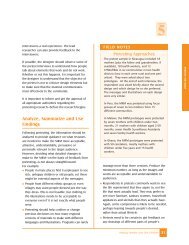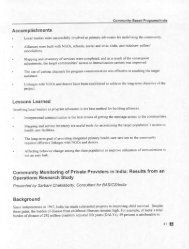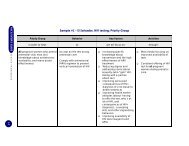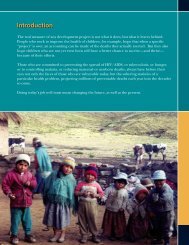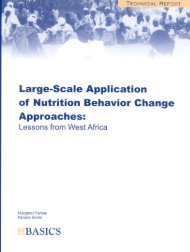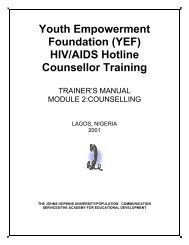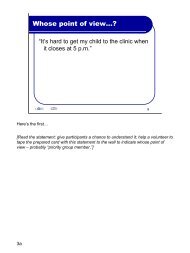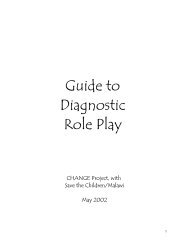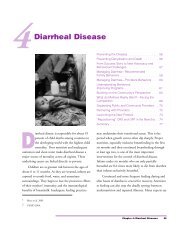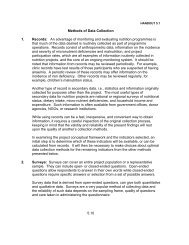MODULE TWO: COUNSELLING - FHI 360 Center for Global Health ...
MODULE TWO: COUNSELLING - FHI 360 Center for Global Health ...
MODULE TWO: COUNSELLING - FHI 360 Center for Global Health ...
You also want an ePaper? Increase the reach of your titles
YUMPU automatically turns print PDFs into web optimized ePapers that Google loves.
3. Help the caller to express his/her feelings and acknowledge the<br />
client’s sense of loss<br />
Ask open-ended questions to help a caller explore and verbalise his/her feelings.<br />
(Ex: “How did you feel watching him/her die?”). Ask him/her what the hardest<br />
thing is to deal with on a daily basis. Acknowledge his/her feelings.<br />
4. Explain what the caller can expect next<br />
For some callers, it may help to explain the stages of the grieving process, so<br />
that they know what to expect and understand that they will eventually be able<br />
to conquer their grief. For example, a counsellor might say to a client who is in<br />
denial: “I know that your wife’s death is hard to accept. Once you are able to<br />
accept that she is gone, however, then you will be able to heal yourself. While<br />
you are recovering from your loss you may experience feelings of guilt or anger,<br />
and you will feel a lot of pain. Eventually, though, you will be able to cope with<br />
your grief.” Such in<strong>for</strong>mation may be too much <strong>for</strong> other callers to handle,<br />
especially if they want their grief to disappear overnight. The counsellor will<br />
need to make this decision on a case-by-case basis.<br />
5. Encourage the caller to seek support and develop a plan<br />
Ask caller how s/he has dealt with loss in the past, and help him/her assess<br />
whether this strategy would be appropriate <strong>for</strong> the present situation. Encourage<br />
the caller to seek support from friends, family members or professional sources.<br />
Provide referrals if necessary.<br />
Counselling Scenarios<br />
1. You are a 35-year old woman whose husband just died of AIDS a week ago.<br />
You have recovered from the initial shock, but are dealing with intense feelings<br />
of anger. He got infected with HIV through having sex with prostitutes behind<br />
your back. You learned a few months be<strong>for</strong>e his death that you are also<br />
infected with HIV, but you are not sick yet. You have two children, but luckily<br />
they are not infected. You are scared about caring <strong>for</strong> them alone and are also<br />
afraid to face the possibility of your own death. A friend told you to call the YEF<br />
HIV/AIDS Hotline to see if there were any support groups that you could join.<br />
2 You are a 15-year old boy whose mother died of AIDS six months ago. You<br />
were very close and still miss her terribly. Your father deserted you when you<br />
were little, so your mother was the head of the household. You have been<br />
<strong>for</strong>ced to drop out of school in order to earn money to support yourself and your<br />
three brothers. You feel guilty that you weren’t able to care <strong>for</strong> your mother well<br />
enough to keep her from dying. Your aunts and uncles all live back in the<br />
village, so you don’t have any adults to turn to <strong>for</strong> support. A friend suggested<br />
that you call the YEF HIV/AIDS Hotline to talk to someone about your problems<br />
and see if you could get any help with household expenses.<br />
Session 9 – Pg. 6



